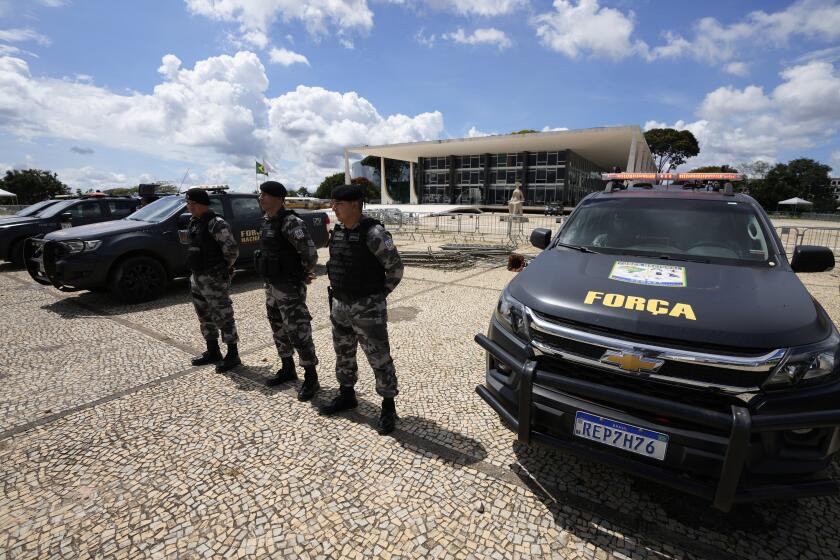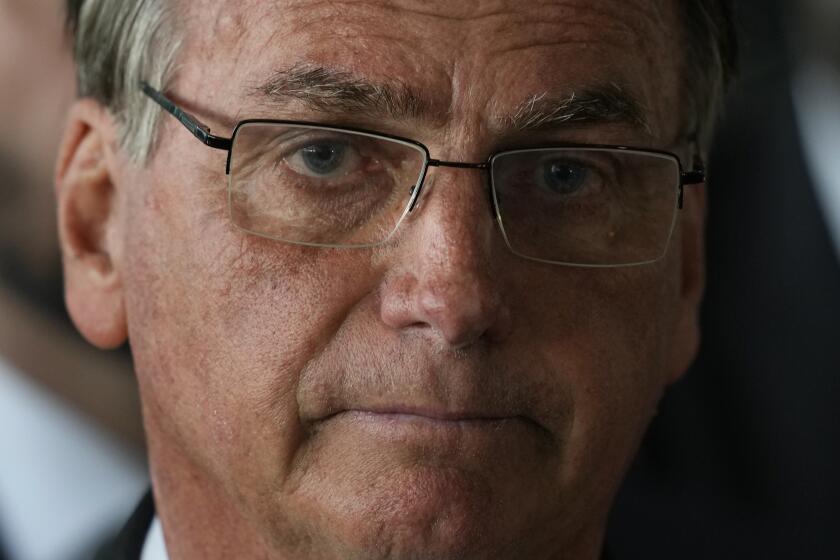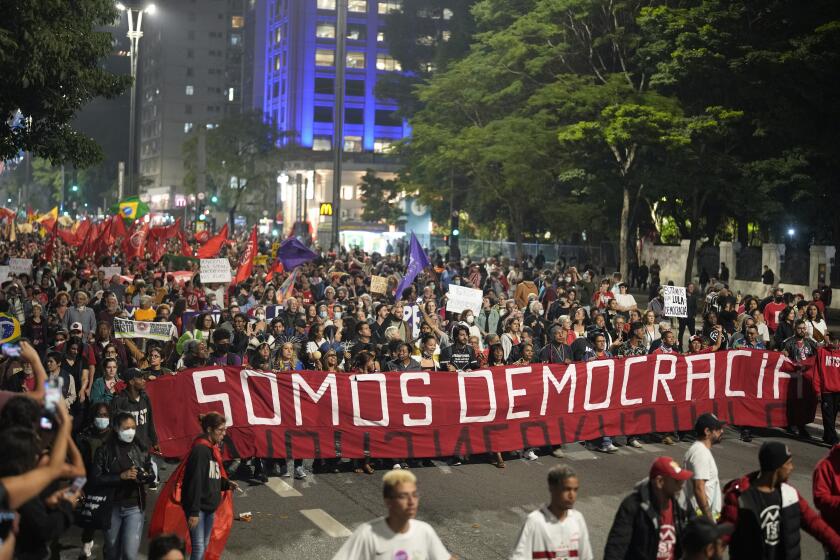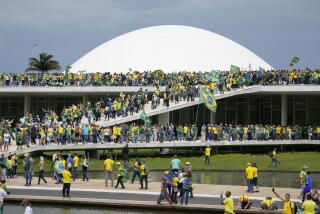Pro-Bolsonaro rioters in Brazil plotted openly online, promising a huge ‘party’
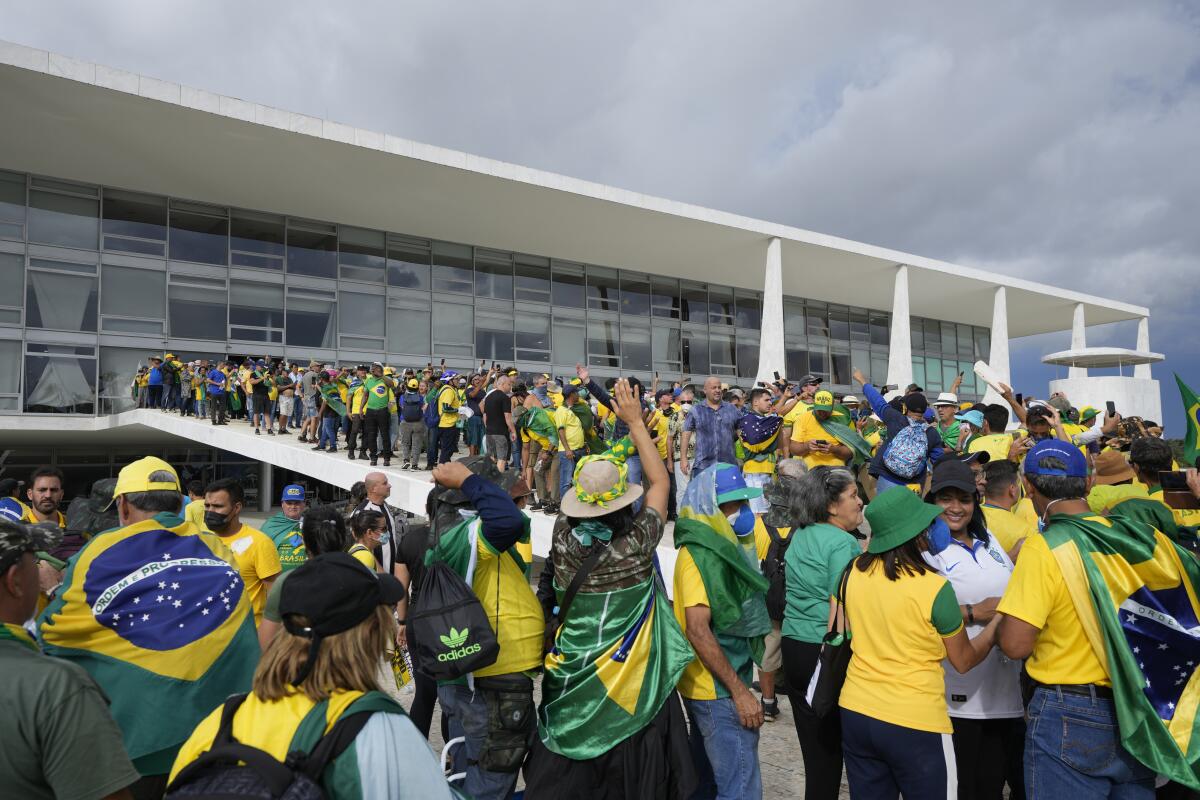
- Share via
MIAMI — The map was labeled “Beach Trip” and was blasted out to more than 18,000 members of a public Telegram channel called, in Portuguese, “Hunting and Fishing.”
But instead of outdoor recreation tips, the 43 pins spread across the map of Brazil marked cities where bus transportation to the capital, Brasilia, could be found for what promoters promised would be a huge “party” on Jan. 8.
“Children and the elderly aren’t invited,” according to the post — since removed — on the Telegram messaging app. “Only adults willing to participate in all the games, including target shooting of police and robbers, musical chairs, indigenous dancing, tag, and others.”
The post was one of several thinly coded messages that had circulated on social media ahead of Sunday’s attack in Brasilia by supporters of former President Jair Bolsonaro looking to restore the far-right leader to power.
It’s also now a potentially vital lead in a fledgling criminal investigation into how the rampage was organized and how officials missed clues to a plot that, like the Jan. 6, 2021, attack on the U.S. Capitol two years ago, appears to have been organized and carried out in plain view.
And like the attack in the U.S., the Brazilian riots demonstrate how social media make it easier than ever for anti-democratic groups to recruit followers and transform online rhetoric into offline action.
Brazil’s capital braced for violent demonstrations by Bolsonaro supporters aiming to overturn the presidential election. But few protesters showed up.
On YouTube, rioters livestreaming the mayhem racked up hundreds of thousands of views before a Brazilian judge ordered social media platforms to remove such content. Misleading claims about the election and the uprising also could be found on Twitter, Facebook and other platforms.
But even before Sunday’s riot, social media and private messaging networks in Brazil were being flooded with calls for one final push to overturn the October election of Luiz Inácio Lula da Silva — something authorities appear to have inexplicably missed or ignored.
Most of the online chatter referred to the planned gathering at Brasilia’s Three Powers Plaza as “Selma’s party” — a play on the Portuguese word “selva,” a battle cry used by Brazil’s military.
Participants were told to bring their own mask to protect against “pepper pie in the face” — pepper spray fired by security forces. They also were told to dress in the green and yellow of Brazil’s flag, not the red preferred by Lula’s Workers’ Party.
Before his supporters stormed government buildings in Brasilia, ex-President Jair Bolsonaro slipped away to Orlando, where he is reported to be staying.
“Get ready guests, the party will be a blast,” the widely circulated post said.
“It was all in the open,” said David Nemer, a Brazil native and University of Virginia professor who studies social media. “They listed the people responsible for buses, with their full names and contact information. They weren’t trying to hide anything.”
Still, it’s unclear to what extent social media were responsible for the worst attack on Brazil’s democracy in decades. Only a few far-right activists showed up at gas terminals and refineries that were also pinpointed on the “Beach Trip” map as locations for demonstrations planned for Sunday.
Bruno Fonseca, a journalist for Agencia Publica, a digital investigative journalism outlet, has tracked the online activities of pro-Bolsonaro groups for years. He said the activists live in a state of constant confrontation, but sometimes their frequent calls to mobilize fall flat.
Protesters in Brazil demand jail for rioters who invaded and vandalized government buildings in an effort to return former President Jair Bolsonaro to power.
“It’s difficult to know when something will jump out from social media and not,” said Fonseca, who in a report this week traced the spread of the “Selma’s party” post to users who appear to be bots.
Still, he said, authorities could have paired the online activity with other intelligence-gathering tools to investigate, for example, a surge in bus traffic to the capital before the attacks. He said their inaction may reflect negligence or the deep support for Bolsonaro among security forces.
One gnawing question is why, on the day of the chaos, Anderson Torres, a Bolsonaro ally who had just been named the top security official in Brasilia, was reportedly in Florida — where his former boss has been staying. Torres was swiftly fired, and Brazil’s supreme court has ordered his arrest pending an investigation. Torres denied any wrongdoing and said he would return to Brazil and present his defense.
The violence came after voters were bombarded by false and misleading claims before last fall’s vote. Much of the content focused on unfounded concerns about electronic voting, and some featured threats of violent retaliation if Bolsonaro was defeated.
The Biden administration is under growing pressure to expel Jair Bolsonaro from a post-presidential retreat in Florida following an attack by his supporters on Brazil’s capital.
One of the most popular rallying cries used by Bolsonaro’s supporters was #BrazilianSpring, a term coined by Stephen K. Bannon, a longtime advisor to former President Trump, in the hours after Bolsonaro’s loss to Lula.
“We all know that this Brazilian election was going to be contentious,” said Flora Rebello Arduini, a London-based campaign director with SumOfUs, a nonprofit group that tracked extremist content before and after Brazil’s election. “Social media platforms played a vital role in amplifying far-right extremist voices and even calls for violent uprising. If we can identify this kind of content, then so can they [the platforms]. Incompetence is not an excuse.”
Brasilia steeled itself Wednesday for the possibility of new attacks fueled by social media posts, including one circulating on Telegram calling for a “mega-protest to retake power.” But those protests fizzled.
In response to the criticism, Telegram, YouTube and Facebook said they were working to remove content urging more violence.
Breaking News
Get breaking news, investigations, analysis and more signature journalism from the Los Angeles Times in your inbox.
You may occasionally receive promotional content from the Los Angeles Times.
“Telegram is a platform for free speech and peaceful protest,” Telegram spokesman Remi Vaughn wrote in a statement to the Associated Press. “Calls to violence are explicitly forbidden and dozens of public communities where such calls were being made have been blocked in Brazil in the past week — both proactively as per our Terms of Service as well as in response to court orders.”
A YouTube spokeswoman said the platform has removed more than 2,500 channels and more than 10,000 videos related to the election in Brazil.
Meta, which owns Facebook, Instagram and Whats-App, has prioritized efforts to combat harmful content about Brazil’s election, a company spokesman told the AP.
More to Read
Sign up for Essential California
The most important California stories and recommendations in your inbox every morning.
You may occasionally receive promotional content from the Los Angeles Times.
